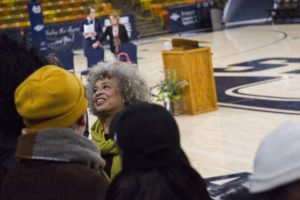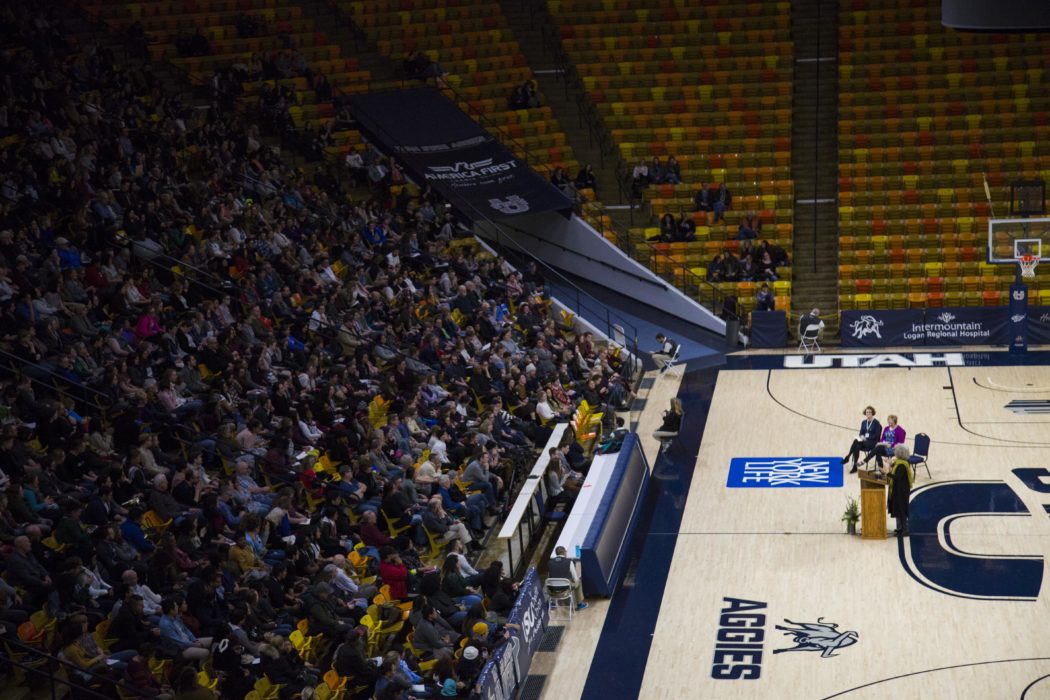World renowned social justice activist speaks to USU
Angela Davis, an African American social justice icon, visited Utah State University Thursday. The event, organized by the USU Center for Women and Gender, drew an audience of more than eight times what was originally expected.
The event was held in the Dee Glen Smith Spectrum in order to hold the hold the crowd of 3400 people, said Reni McBride, a staff assistant for the center.
Originally intended for 400 attendees in the Eccles Conference Center, the unexpected volume forced the center to change venues to accommodate the surplus, McBride said.
The extra numbers did not faze Davis who spoke about race, women in leadership, human unity and the role of art as a catalyst for social progress. She was officially welcomed to USU campus, which was historically Shoshone land, by two Native American students.
“I would especially like to thank the two indigenous students for welcoming me,” Davis said in her opening remarks, “because we do live on colonized land; we live on stolen land.”
Davis has, at times, been a divisive figure in American politics because of her intense work and life. She was a Black Panther, and was involved with the Communist Party in the 1970s. She eventually decided to distance herself from the party when it became more and more extreme. She was also in jail for a year because she was accused of murder. She was later acquitted and released from jail thanks to consistent social pressure.
However, Davis isn’t really interested in how she will be perceived as an individual.
“That’s not something that matters that much to me,” she said. “But it does matter that people understand that when we come together and join hands and work together across all the boundaries that are meant to divide us, then we can make an enormous difference in the world.”
Upon ending her opening remarks, she shifted to talk about black history, relating it to Native American history as well.
“This month, we celebrate the accomplishments of a people who unrelentingly refused to surrender as they moved from slavery in the direction of freedom. Over 150 years after the punitive abolition of slavery, black people are still dramatically involved in the quest for freedom,” Davis said. “Black history is the very core of the history of the United States, and when we talk about black history, we have to recognize the way in which it is interconnected with the histories of indigenous people. Colonization and slavery were very much interconnected.”
She then took her speech to her main point: art’s role in social justice.

Angela Davis at the USU Spectrum Feb. 15 where she addressed more than 3,000 people.
“The knowledge we acquire through art, through any art form, is special,” Davis said. “It is often bathed in a kind of exhilaration that allows us to incorporate that knowledge into our own experience in a way that does not generally happen when we confine ourselves to purely conceptual forms of knowledge.”
She also discussed black musicians’ contributions to the civil rights movement.
“We don’t often acknowledge that interracial groups of musicians traveled through the south long before the Montgomery bus boycott,” Davis said, “and engaged in subversions of segregational policies of the south.”
Davis also referenced “Parable of the Sower” by black author Octavia E. Butler. Davis called the dystopian science fiction novel an example of when art has the ability to offer us an experience that illuminates our past, present and future. In the book, a young black woman is the leader of a movement. Davis made a point to dismantle the image of leadership as intrinsically male.
“It can be feminist; it can be collective,” she said.
Davis asked the men in the audience to speak up when they witness other men make disparaging comments about women.
“This is how we change consciousness,” she said. “This is how we change the world.”
Denishia Tsosie, the president of the Native American Student Council at USU, gave her impression on Davis’ speech.
“It was great to see her speak,” she said. “Everyone looks up to her because she played such a big role for social justice in history, and she’s still alive. I wanted to hear about her experience and how things have changed.”
Davis, at the end of her speech, called for community building and suggested that individuals need allies in order to cause change. She said if you stand alone, “you’ll be cut down.”
Tsosie echoed Davis’ calls for collective action and unity.
“We shouldn’t be controlled by race and all the negativity that divides us,” Tsosie said.

